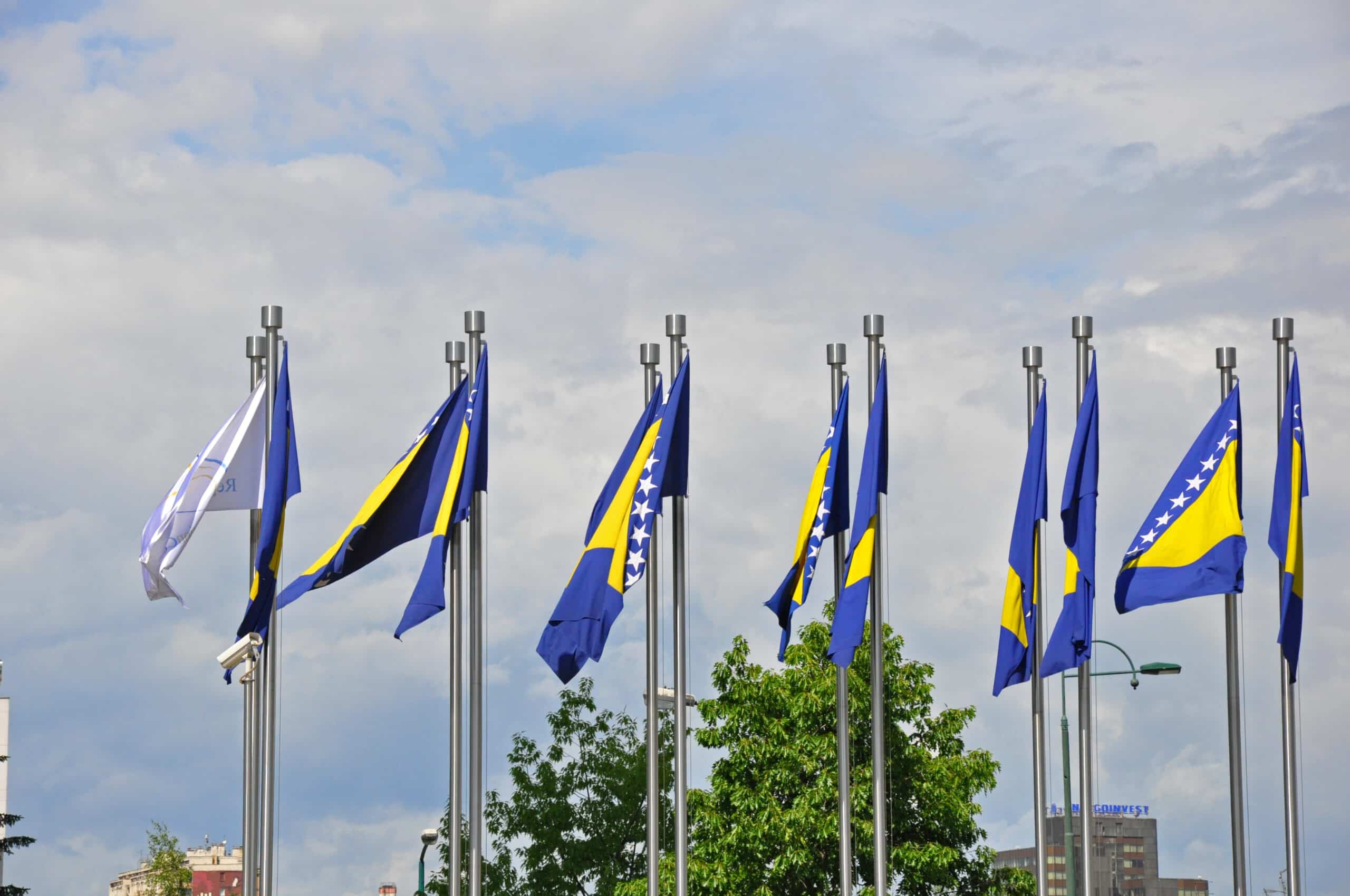Photo – Flags outside the Parliament of Bosnia & Herzegovina: Wikimedia Commons
On Sunday October 6, municipal elections were held in Bosnia & Herzegovina. These elections took place against the background of extreme weather and flooding in southern parts of the country, especially in the city of Jablanica. For this reason, the elections in the regions that were most heavily hit have been postponed. You can donate to help victims of the floods in Bosnia & Herzegovina here.
A total of 3,400,204 registered voters could vote during these elections. However, as the last official census was held in 2013, this number is suspected to be inaccurate and has led to fear of voter fraud. This is also reflected in the fact that more than 6% of all votes have been declared invalid by the Central Election Committee. Moreover, an International Election Observation Mission found several irregularities at polling stations, such as efforts to influence voters and proxy voting. The overall turnout was 47.7%.
Election Results
Bosnia & Herzegovina is divided into two political entities: the Federation of Bosnia and Herzegovina (FBiH) and the Republika Srpska (RS). The FBiH mainly consists of ethnic Bosnians and Croats, while the RS mainly consists of ethnic Serbs. In both entities, different political parties participate. In the FBiH the main parties are the Party of Democratic Action (SDA), the Croatian Democratic Union of Bosnia and Herzegovina (HDZ), and the Trojka, a progressive coalition of the Social Democratic Party (SDP), the People and Justice Party (NP) and Our Party (NS). In RS the biggest parties are the Alliance of Independent Social Democrats (SNSD) and the Serb Democratic Party (SDS).
In Sarajevo, the capital city of Bosnia & Herzegovina and the biggest city of the FBiH, the Trojka parties won in most of its districts. In the remainder of the FBiH, the SDA became the biggest party, electing a mayor in 30 municipalities, while the HDZ achieved this in 17 and the Trojka parties in 11 municipalities. In comparison to the previous municipal elections in 2020, the SDA won 3 more mayor positions, whereas the HDZ lost 4 and the Trojka parties lost 2 mayor positions
In the RS, the SNSD became the biggest party, winning more than half of all the municipalities in RS, while the SDS followed far behind. However, in the administrative capital and the biggest city of the RS, Banja Luka, the Party of Democratic Progress (PDP), a small party that won only in two municipalities in the RS, won from the SNSD. The SNSD elected a mayor in 47 municipalities, while the SDS could only do this for 12 municipalities. The SDS lost 4 mayor positions, while the SNSD won 3 of them.
For more details, you can find the exact election results per municipality here.
Election Trends
Even though the election results were not very different from last time, they do seem to suggest a victory for the SNSD and the SDA, both big parties that represent one of the three major ethnic communities in Bosnia and Herzegovina. The SNSD represents the Serbian community, while the SDA represents the Bosnian community. At the same time, smaller parties, such as the members of the Trojka, which do not explicitly represent one single ethnic group, are becoming smaller.
This takes place against rising tensions within Bosnia and Herzegovina. Milorad Dodik, the president of the RS and the leader of the SNSD, has for example expressed his wish for a separation between the RS and the FBiH, accusing the Bosnian population of ignoring the interests of Serbs and Croats. The election results, to some extent, seem to reflect this increase in division. This is a very worrisome development, which might lead to the people of the RS and the FBiH being pitted against each other.
The Trojka
At the last presidential election in 2022, the Trojka performed surprisingly well, defeating the presidential candidate of the SDA. In these municipal elections, this success has not repeated itself. At the same time, however, the Trojka did keep their majority in most of the municipalities where they also were the biggest last time. This was one of their aims for this election. Moreover, in Sarajevo, the mayor will be elected by the city councils, and the good results they established there, gives them good chances of being able to have a mayor from one of the Trojka parties there.
The Trojka, and especially the SDP, the biggest party of the coalition, is one of the few parties in Bosnia & Herzegovina that does not explicitly represent one of the three main ethnic groups, but attempts to unite people with different themes, such as countering unemployment and elevating people out of poverty. Even though the Trojka performed relatively well these elections, they did not really achieve this end as they were almost exclusively elected in FBiH, but not in the RS.
Nonetheless, their aim, to unify people along other lines than ethnicity or religion is very welcome in times that tensions are increasing. In contrast to Dodik, who is actively undermining the unity of Bosnia and Herzegovina, and consequently the chances of becoming a member of the EU, the Trojka has a vision of a future that is not marked by division.
Before the elections we organized a webinar with Lana Prlić (SDP) and Damir Mašić (SDP), both members of the Bosnian Federal Parliament. If you are interested, you can watch this webinar here.
Written by Guido Boven



